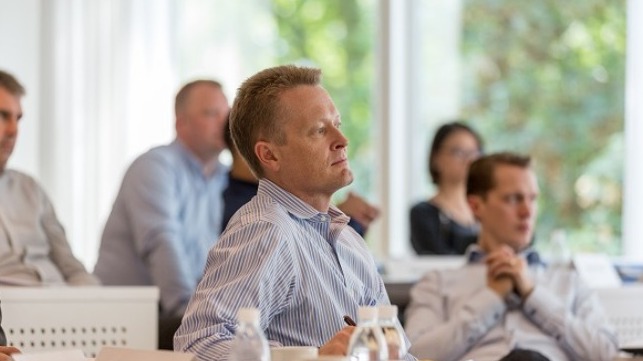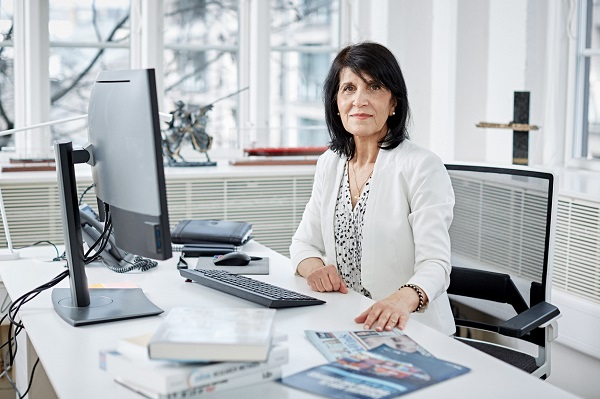Taking the Next Step in Business Leadership with the Blue MBA

With over 25 years' of maritime experience, mainly in ship operating and shipowning, Thomas Damsgaard was tempted to think that he knew all that he needed to know. He might easily have fallen prey to complacency; after all, shipping has a reputation for being conservative.
But he was determined not to be trapped in a rigid mindset. “I worked on a management buyout, and working with private equity, I realized that the conversations should have been a bit different. We were starting to see more financial people stepping in, and I realized that a new set of tools was required for me to keep moving ahead at the pace I wanted to.”
There was more. “I started to see the value chain being more integrated. It wasn't 'us and them' anymore, we were doing it together, and I felt the need to step out and reflect on these new relationships and the way that they changed a company's success. Winning in the market wasn't just about price anymore. There were a lot of other factors that played in.”
These trends motivated Damsgaard to pursue a Blue MBA – formally known as the Executive MBA in Shipping & Logistics - at Copenhagen Business School. Even though he was based in the U.S., he found that the Copenhagen-based program offered a more global and commercial orientation than the U.S. schools he considered - “more than how to run terminals, ports, lines in North America.”
The Blue MBA taught him a new approach, how to deploy a much more informed curiosity and ask questions in a way that enabled him to start having conversations about solutions. “I think there is a lot of change that needs to happen, and change starts with changing the conversation. At a very core level, this is what the Blue MBA program has enabled me to do.”
The Blue MBA program, which is considered number one of its kind in the world, is spearheaded by program director Irene Rosberg at the Copenhagen Business School which is among the one percent of global business schools that holds the coveted triple accreditation - AACSB, EQUIS and AMBA.

Irene Rosberg, program director
“We have 274 graduates today who are all occupying very high-level corporate or organizational positions around the world. Because of the impact that we have had on the industry, it is highly supportive of people who want to undertake the program,” she said. “What makes this program unique is its relevance to the sectors we serve. Everything that we do, our students can make use of to apply directly to their jobs. It's learning by doing.”
It is not unusual for participants to join the program with 20 years of work experience (a minimum of five is required), but despite this, they might lack what these days is ultimately essential for business resilience and even survival: a holistic, global view of the industry. Rosberg says, the next generation of leaders needs to be able to read the market accurately and in depth, and understand operations management, the supply chain and the role of information technology. They need to know how to set strategy and then implement it. “These are the skillsets that we make sure our participants grasp thoroughly.”
Part of that involves learning from each other and building lasting networks. Participants come from across the industry: owners, operators, equipment manufacturers, IT, finance, law, ship broking, naval architecture and port operations. “When the students come into the classroom, the dynamic is absolutely incredible, because not only do they learn from their professors and lecturers, they learn a lot from each other.”
The Blue MBA is specifically designed to suit working professionals. The program is module-based, with eight modules spread over 22 months. Participants get together for one week at a time, and during the final seven months each of them works on a major project of strategic importance to their company. That is known as the Integrated Strategy Project.
For Damsgaard, that project proved timely indeed. In 2017, he analyzed supply chain challenges associated with the shipping of the pelletized resin derived from the shale gas. It was a time when production grew by several hundred percent within a couple of years. He talked to producers, ocean carriers and other stakeholders to develop a range of ways of getting the massive produced quantities of pellets to market.
In his next position, he used the inspiration gained from his MBA experience to once again implement transformational change, this time away from brick and mortar offices to a more agile organization with flexible work arrangements for the company's employees. “The hardest thing to change is peoples' minds, especially in the face of uncertainty. You have to know how to deal with distrust and possess the skillset needed to develop people. That, too, I learned from my MBA.
“The outcome worked incredibly well for the company, and it continues to do so now - especially in the face of the changes we are currently experiencing with the coronavirus.”
For Rosberg, keeping the course current in the face of global change is of paramount importance. “We make sure we are not delivering yesterday's program for tomorrow’s challenges. We rework the program work on it all the time while remaining true to its underlying principles. The industry is changing so much, and our aim is to make sure we translate those challenges into our academic program.
“The participants have a huge responsibility in designing strategy for their company or organization, and because of the relevance of the program to the work they are currently doing, they use it as a stepping-stone in aspiring to get to the next, higher position. For participants that are already CEOs, they learn how to expand their business and how to develop new and profitable avenues. Our success separates us from the crowd.”
The next intake for the CBS Blue MBA is in September 2021. Visit our website to set up a virtual meeting with program director Irene Rosberg and discuss your candidacy.
The opinions expressed herein are the author's and not necessarily those of The Maritime Executive.
